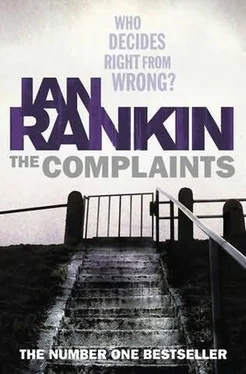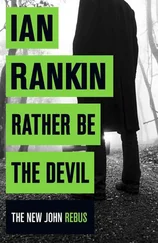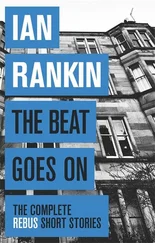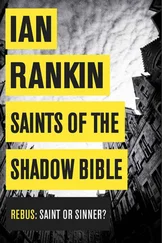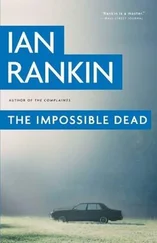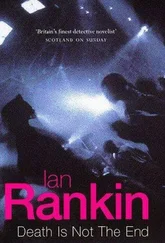‘How so?’
‘Being out with the Frumpster meant I got all the attention.’
‘Beauty and the Beast?’
‘She wasn’t that bad, Malcolm.’ But the putdown was half-hearted at best. ‘Anyway, we ended up in a pub on St Martin’s Lane or somewhere… You don’t know London, do you?’ She watched Fox shake his head. ‘You’d hate it – too big, too full of itself…’ She seemed to be drifting away, but managed to stop herself. ‘Vince was in a crowd of half a dozen. There’d been a football game that lunchtime and it looked like they’d been celebrating ever since. They insisted on buying us drinks…’ She paused again, lost in thought. ‘Vince was the same as them but different. He didn’t seem to have put as much away as his pals. He was quieter, almost shy. He wrote his mobile number on the back of my hand, said he’d leave the rest to me.’
‘It was up to you to take the initiative?’
‘I suppose…’
‘And it turns out you did.’
But Jude was shaking her head. ‘I had a shower the next morning, and the number was gone. Far as I was concerned, he was just a fella in a Sunday-night boozer. But Melissa had hooked up with one of the guys. Week later, he turned up to fetch her from the office…’
‘Vince was with him?’
She smiled. ‘Wanted to know why I hadn’t called.’
‘The four of you went out together?’
‘The four of us went out together,’ she confirmed. ‘Melissa broke up with Gareth after about a fortnight.’ Her eyes were glassy with tears, but she blinked them back. ‘I never expected us to last.’
Fox watched his sister rub her eyes against either shoulder of her T-shirt. There was writing on the front of the shirt, along with an illustration. It was from a rock tour, and Fox remembered that Vince Faulkner had often taken Jude to concerts. They’d travelled as far afield as Paris and Amsterdam for certain bands.
‘You never really knew him,’ Jude was saying. ‘You never made the effort.’
All Fox could do was nod his agreement.
‘He wasn’t all candyfloss and ice cream, Jude.’
‘Because he’d been in trouble with the law?’ Her eyes were fixing on his. ‘That’s the thing, though – people like you can’t see past that. It was ancient history, yet that man Giles kept harping on about it, and the papers keep saying it.’
‘And he kept it from you, Jude. He didn’t want you to know.’
‘Because it wasn’t him any more!’ Her voice was rising. ‘And don’t start saying he was beating me up – I don’t want to hear it! The papers have got hold of that, too, and who is it’s been feeding them all this crap if not your lot?’
‘They’re not my lot,’ Fox said under his breath. ‘Not any more.’
He spent much of the evening lifting books from the bookshelves in his living room and placing them on the coffee table. His intention was to put them in alphabetical order, maybe with a split into two categories – ones he’d read; ones he hadn’t. But then he wondered if maybe some of them couldn’t go to a charity shop. And of the ones left for reshelving, should he initiate a further subdivision into fiction and non-fiction? He’d eaten chicken curry for his supper, using up the ingredients bought from Asda when he’d gone there to talk to Sandra Hendry. The chicken had come from a Co-op on the way back from Jude’s. He was now suffering from discomfort, having eaten too much.
‘Maybe they could all go,’ he told himself, staring at the piles of books. That would mean he could dispense with the shelving, creating more space. But space for what, exactly? A bigger TV, one of those home cinema systems? He would just end up watching more rubbish than ever. When his mobile trilled, he was happy to answer it. It was a text message from Annie Inglis, inviting him to lunch on Sunday. She provided her address and ended her message with the simplest of questions:
OK?
Fox ran his fingers through his hair and found that he was sweating from his work with the books. Never the world’s most expert texter, it took him three trial runs before he decided he was happy with his reply. Only then did he press the ‘send’ button. His message had been a succinct OK, no question mark required.
Saturday 14 February 2009
Saturday, Fox slept late, but then he hadn’t fallen asleep until two. By eleven, he was seated at the kitchen table with three newspapers – Scotsman, Herald and the very earliest printing of the Evening News. He was looking for background on Charlie Brogan, and Scottish journalism was happy to oblige. Working-class roots, raised and schooled in Falkirk. His father had been a joiner, Charlie picking up some skills even before school had kicked him out. His CV was copious and wide-ranging, taking in everything from carpet-fitting to door-to-door selling. The two had combined eventually, Brogan setting up a company that sold floor coverings to factories and businesses. By twenty-three, he had enough money going spare that he could afford a punt – buying flats and either letting them out or refurbishing them for resale. The economy was buoyant and Brogan prospered further, moving into full-scale land development and rubbing shoulders with the rich and influential. He enjoyed the hospitality of bankers and other businessmen, dated some of Scotland’s most eligible young women and eventually met and married Joanna Broughton.
The papers carried several snapshots of Joanna. She’d always been a looker, but there was a hardness to her features and her stare. Even smiling, she let the photographer know she was the boss. The interior of the Inverleith penthouse featured in one picture, its walls festooned with art. A sidebar had been contributed by a professional psychologist who warned that more tragedies involving one-time high-flyers might be the inevitable outcome of the credit crunch.
The sole public failure in Brogan’s long career had come when his attempt to join the board of Celtic FC was rebuffed. One of his friends reminisced for the Herald about the incident: ‘Charlie never got used to people saying no to him. It festered to the extent that he discussed switching his allegiance to Ibrox – that’s the kind of guy he was.’
The hot-headed kind, Fox thought to himself. Not the kind to rationalise a snub if he could stew about it instead. A man who would see the economy’s doldrums as a personal affront. But that phrase about Ibrox… about not giving in but getting even… it didn’t hint that Brogan was the sort to just give up. He would want to fight back. The psychologist had focused on the economy without bothering to debate the most important question: could Charlie Brogan have been classed as a suicide risk? There was no mention that any note had been left; no evidence that he had tidied up his affairs before taking the plunge. But then maybe that was fair enough – he’d taken his boat out, drifting further and further from his troubles, tranquillising himself with pills and alcohol. He could have gone on deck, stumbled and fallen overboard. Or that impetuous streak might have suggested to him suddenly that he should finish things properly. Not a planned suicide, but absolutely of the moment.
There had been no comment from the family, apart from the original statement issued through Gordon Lovatt. Fox stared at Joanna Broughton’s photograph.
‘You made sure you had a media angle,’ he told her, ‘before you let anyone else in on it.’
Was that cold? Was it calculating? Or just a smart woman being smart? Fox stared and stared and couldn’t decide. He took a break, stretching his spine and loosening his shoulders. Through in the living room, he saw that the coffee table was covered in books. There were more on the floor in front of the shelves, the shelves themselves denuded. Dust hung in the air. So far, he’d found only half a dozen titles that he felt no further use for, heavily outnumbered by those he wanted to read again. When his phone rang, he had to hunt for the handset. It was hidden between two of the piles.
Читать дальше
